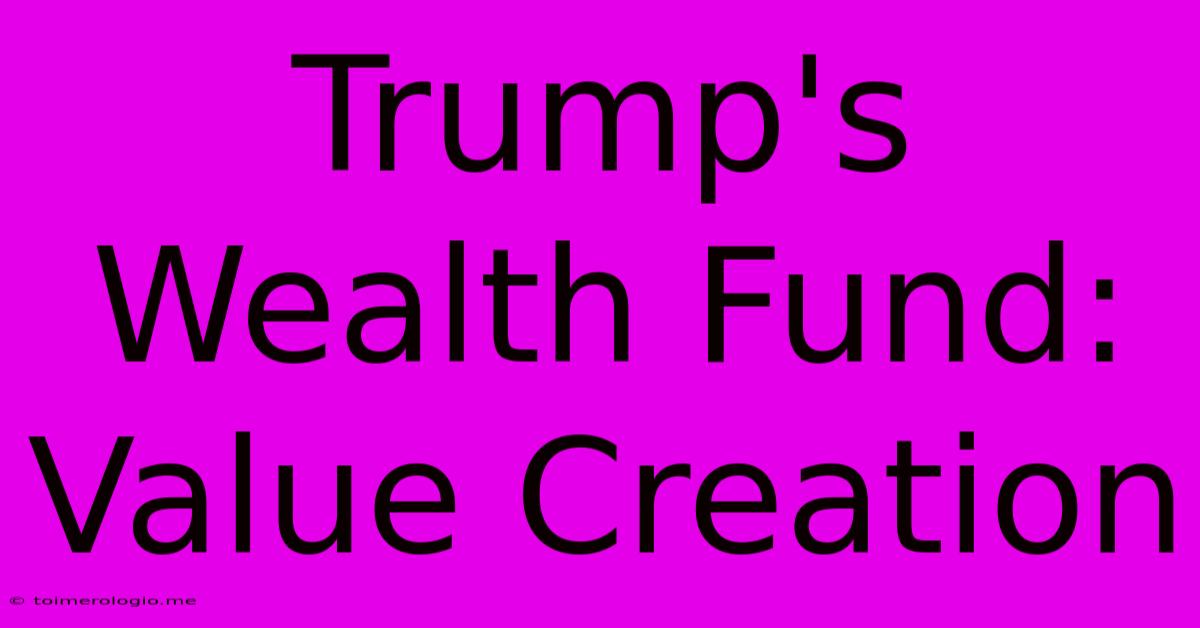Trump's Wealth Fund: Value Creation

Discover more detailed and exciting information on our website. Click the link below to start your adventure: Visit Best Website toimerologio.me. Don't miss out!
Table of Contents
Trump's Wealth Fund: Value Creation – A Deep Dive into the Trump Organization's Financial Strategies
Donald Trump's business career has been marked by both immense success and significant controversy. Understanding how his wealth was built and managed requires a nuanced examination of the Trump Organization's financial strategies, often referred to informally as his "wealth fund," although it doesn't operate as a traditional investment fund. This article delves into the key aspects of value creation within the Trump Organization, analyzing the methods employed, their effectiveness, and the ethical considerations that have surrounded them.
The Pillars of Trump's Value Creation: Real Estate and Branding
The foundation of Trump's wealth lies primarily in real estate development and the masterful leveraging of his personal brand. These two pillars have been intricately intertwined throughout his career, creating a powerful synergistic effect.
Real Estate Development: A Focus on High-Profile Projects
Trump's real estate ventures have consistently focused on high-profile, luxury properties in prime locations. This strategy hinges on several key elements:
-
Location, Location, Location: The emphasis on prime locations, whether in Manhattan, Las Vegas, or other major cities, is paramount. These locations command high prices, ensuring significant potential for appreciation and rental income.
-
Luxury Branding: Trump's developments are often marketed as luxurious and exclusive, appealing to a high-net-worth clientele willing to pay a premium for prestige. This branding extends beyond just the physical properties; it permeates the entire experience, from marketing materials to customer service.
-
Leveraging Debt: Trump has frequently employed high levels of debt financing in his real estate projects. This strategy, while risky, allows for significant amplification of returns when successful, but also magnifies losses in case of failure. Understanding his sophisticated use of debt is crucial to understanding his financial strategies.
-
Rebranding and Revitalization: Several of Trump's most successful projects involved acquiring undervalued or underperforming properties and rebranding them as luxurious destinations. This demonstrated his skill in identifying opportunities and creating value through strategic repositioning.
The Trump Brand: An Untapped Asset
Beyond real estate, the Trump brand itself has been a major driver of value creation. His name has become synonymous with luxury, success, and (controversially) power. This brand recognition translates into:
-
Higher Property Values: The Trump name on a building immediately increases its perceived value and attracts higher-paying tenants and buyers.
-
Licensing and Franchising: The Trump brand has been licensed to various projects globally, generating significant revenue streams outside of direct real estate development.
-
Media Appearances and Attention: Trump's high-profile media presence, whether positive or negative, often translated into increased publicity for his businesses, boosting brand awareness and driving sales.
Controversies and Ethical Considerations
While the Trump Organization's value creation strategies have been undeniably successful, they have also been accompanied by considerable controversy:
-
Financial Transparency: Questions surrounding the financial transparency of the Trump Organization have consistently been raised. Critics argue that a lack of detailed financial disclosures makes it difficult to fully assess the true value and profitability of his ventures.
-
Debt Management: Trump's heavy reliance on debt has raised concerns about his financial stability and the potential risks associated with his businesses. Bankruptcies filed by some Trump-owned entities further fuel these concerns.
-
Conflicts of Interest: Trump's presidency raised significant ethical questions regarding potential conflicts of interest between his business interests and his public duties. The blurring of lines between personal wealth and political office attracted criticism from various quarters.
-
Tax Strategies: Trump’s tax strategies have been scrutinized for aggressive tax avoidance techniques, raising questions of fairness and ethical conduct. These strategies have been subjects of investigations and public debate.
Analyzing the Effectiveness of Trump's Strategies
The effectiveness of Trump's wealth-creation strategies is a complex issue. While his net worth has undeniably grown significantly, several factors need to be considered:
-
Market Timing and Luck: A degree of fortunate market timing and general economic conditions undoubtedly contributed to his success.
-
Risk Tolerance and Leverage: His high-risk, high-reward strategies have paid off handsomely at times but also resulted in financial setbacks.
-
Brand Management and Marketing: His masterful branding and marketing skills have been crucial in driving demand and justifying premium prices for his properties.
-
Operational Efficiency: While some projects have demonstrated high operational efficiency, others have been criticized for cost overruns and management issues.
Conclusion: A Legacy of Success and Controversy
Donald Trump's wealth fund, primarily based on real estate development and the strategic leveraging of his personal brand, represents a unique approach to value creation. His strategies, characterized by high-risk, high-reward ventures and a relentless focus on branding, have led to significant financial success. However, this success has been intertwined with considerable controversy, raising questions of financial transparency, ethical conduct, and the potential for conflicts of interest. Ultimately, the enduring legacy of the Trump Organization will likely be a complex blend of both extraordinary financial achievements and significant ethical debates. Further research and analysis are needed to fully understand the long-term impact of his business strategies and their implications for future generations.

Thank you for visiting our website wich cover about Trump's Wealth Fund: Value Creation. We hope the information provided has been useful to you. Feel free to contact us if you have any questions or need further assistance. See you next time and dont miss to bookmark.
Also read the following articles
| Article Title | Date |
|---|---|
| Explainer Sovereign Wealth Funds | Feb 04, 2025 |
| Chelsea Vs West Ham Premier League Result | Feb 04, 2025 |
| Mazzullas Halftime Challenge Celtics Season Start | Feb 04, 2025 |
| Sovereign Wealth Fund Trumps Directive | Feb 04, 2025 |
| Trump Signs Sovereign Wealth Fund Order | Feb 04, 2025 |
